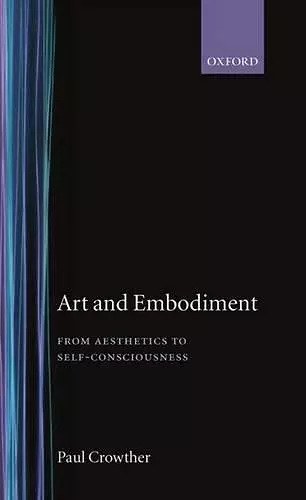Art and Embodiment
From Aesthetics to Self-Consciousness
Format:Hardback
Publisher:Oxford University Press
Published:1st Jul '93
Currently unavailable, and unfortunately no date known when it will be back
This hardback is available in another edition too:
- Paperback£54.00(9780199244973)

By the author of Critical Aesthetics and Postmodernism
Paul Crowther argues that art can bridge the gap between philosophy's traditional striving for generality and completeness, and the concreteness and contingency of humanity's basic relation to the world. He proposes an ecological definition of art: by making sensible or imaginative material into symbolic form, it harmonizes and conserves what is unique and what is general about human experience.In his Critical Aesthetics and Postmodernism Paul Crowther argued that art and aesthetic experiences have the capacity to humanize. In Art and Embodiment he develops this theme in much greater depth, arguing that art can bridge the gap between philosophy's traditional striving for generality and completeness, and the concreteness and contingency of humanity's basic relation to the world. As the key element in his theory, he proposes an ecological definition of art. His strategy involves first mapping out and analysing the logical boundaries and ontological structures of the aesthetic domain. He then considers key concepts from this analysis in the light of a tradition in Continental philosophy (notably the work of Kant, Heidegger, Merleau-Ponty, and Hegel) which–by virtue of the philosophical significance that it assigns to art–significantly anticipates the ecological conception. On this basis Dr Crowther is able to give a full formulation of his ecological definition. Art, in making sensible or imaginative material into symbolic form, harmonizes and conserves what is unique and what is general in human experience. The aesthetic domain answers basic needs intrinsic to self-consciousness itself, and art is the highest realization of such needs. In the creation and reception of art the embodied subject is fully at home with his or her environment.
must be counted a philosophical success not just because its central arguments stimulate a good deal of critical oncjecture but also because this volume of essays operates both intensively and extensively ... By forcing the readers to expand the steps of his reasoning, Crowther awakes the philosophical imagination of his readers prompting them to engage with the subject-matter. Such engagement is surely the point of philosophical discourse and in this respect Crowther succeeds very well ... If Nietzsche marked his approval with the phrase da capo (once more), Crowther's text is worthy of the hermeneutic plaudit "yet more". * Nicholas Davey, British Journal of Aesthetics *
these books ... will become necessary reading for aestheticians and twentieth-century art historians. Earnest, clear, and direct almost to a fault ... His work on embodiment seems to me an important corrective to textualisms both deconstructive and new historicist, and his re-casting of Kant offers a workable contemporary version of idealist aesthetics * Charles Altieri, The Journal of Aesthetics and Art Criticism *
`refreshingly critical introductions to questions of philosophical aesthetics ... a well-argued critique of the intellectual scepticism of Derrida ... I applaud the scope and clarity of Crowther's project; at every step he reviews and summarizes his argument. Such a global undertaking is rare in these days of more tenative scholarship ... His ultimate success or failure will depend in part on the second half of this project ... but such an attempt should attract wide engagement and be given more attention than I am able to provide within the limits of a short review.' Simon Shaw-Miller, University of Manchester, Art History, Volume 17, Number 2, June 1994
'His arguments are lucid, clearly stated and, above all, absorbing ... a welcome contribution to a subject area of philosophy which straddles many disciplines ... Students of the visual arts and of their theory would do well to verse themselves in this kind of work.' Edward Winters, University of Westminster, The Philosophical Quarterly 1995
Paul Crowther's book ... must be counted a philosophical success ... Crowther's terse style provides some stunningly succinct and highly focused articulations of Heidegger's and Merleau-Ponty's aesthetic positions ... What is particularly commendable about Crowther's approach is his willingness to trace the metamorphosis of the grounding themes of aesthetics through contemporary thought ... If Nietzsche marked his approval with the phrase de capo (once more). Crowther's text is worthy of the hermeneutic plaudit "yet more". * British Journal of Aesthetics *
ISBN: 9780198239963
Dimensions: 224mm x 146mm x 18mm
Weight: 399g
218 pages